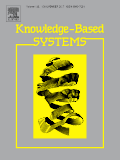Editors, Aims & Scope
CCSpan: Mining closed contiguous sequential patterns
A survey on opinion mining and sentiment analysis: Tasks, approaches and applications
Discriminant sparse local spline embedding with application to face recognition
Intelligent fault diagnosis of roller bearings with multivariable ensemble-based incremental support vector machine
Confidence-consistency driven group decision making approach with incomplete reciprocal intuitionistic preference relations
MEdit4CEP: A model-driven solution for real-time decision making in SOA 2.0
Classification of incomplete data based on belief functions and K-nearest neighbors
4PL routing optimization under emergency conditions
Discriminative subprofile-specific representations for author profiling in social media
A fuzzy expected value approach under generalized data envelopment analysis
NMFE-SSCC: Non-negative matrix factorization ensemble for semi-supervised collective classification
Kernel online learning algorithm with state feedbacks
Measuring cell-id trajectory similarity for mobile phone route classification
On the use of irreducible elements for reducing multi-adjoint concept lattices
Feature selection with redundancy-complementariness dispersion
Automatic classification of personal video recordings based on audiovisual features
Moth-flame optimization algorithm: A novel nature-inspired heuristic paradigm
Efficient algorithms for finding the most desirable skyline objects
A novel semantic smoothing kernel for text classification with class-based weighting
Classifier ensemble creation via false labelling
Dominance-based rough set approach: An application case study for setting speed limits for vehicles in speed controlled zones
Multi-kernel multi-criteria optimization classifier with fuzzification and penalty factors for predicting biological activity
AutoRM: An effective approach for automatic Web data record mining
Multi-aspect-streaming tensor analysis
TEII: Topic enhanced inverted index for top-k document retrieval
On improving parsing with automatically acquired semantic classes
Rare-PEARs: A new multi objective evolutionary algorithm to mine rare and non-redundant quantitative association rules
MLSMOTE: Approaching imbalanced multilabel learning through synthetic instance generation
A local approach to rule induction in multi-scale decision tables
A fast incremental algorithm for deleting objects from a concept lattice
Two-phase anticipatory system design based on extended species abundance model of biogeography for intelligent battlefield preparation
Chaotic fruit fly optimization algorithm
Detecting the financial statement fraud: The analysis of the differences between data mining techniques and experts’ judgments
Construction of a technology adoption decision-making model and its extension to understanding herd behavior
Label propagation based evolutionary clustering for detecting overlapping and non-overlapping communities in dynamic networks
Resource allocation under a strategic alliance: How a cooperative network with knowledge flow spurs co-evolution
A new family of information content models with an experimental survey on WordNet
Modeling and simulation method of the emergency response systems based on OODA
A novel decorrelated neural network ensemble algorithm for face recognition
Query suggestion with diversification and personalization
Multiple criteria ranking and choice with all compatible minimal cover sets of decision rules
Classification of microarray using MapReduce based proximal support vector machine classifier
A cloud model based fruit fly optimization algorithm
Incremental learning from news events
Predicting the success of group buying auctions via classification
A manifold learning framework for both clustering and classification
Automated detection of age-related macular degeneration using empirical mode decomposition
Node-coupling clustering approaches for link prediction
Predicting individual retweet behavior by user similarity: A multi-task learning approach

